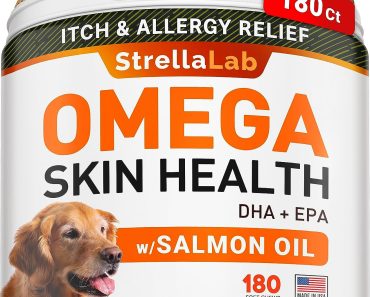
As a dog owner, you may have wondered if it’s safe to share fries with your canine companion. Fries are a popular snack enjoyed by many, but are they safe for dogs? In this article, I will uncover the facts surrounding dogs and fries, addressing the important considerations and potential risks for your furry friend’s health and well-being.
Key Takeaways:
- Fries are not toxic to dogs, but they should be avoided as a regular snack due to their lack of nutritional value.
- Fries are high in fat and calories, which can contribute to obesity and pancreatitis in dogs.
- The salt content in fries can lead to dehydration and salt poisoning in dogs.
- Dogs may have allergies to potatoes, the main ingredient in fries, so caution should be exercised.
- If you choose to give your dog a fry or two, it should be plain without any seasoning or salt.
- Limit the frequency and quantity of fries given to your dog, and consider healthier alternatives like vegetables or homemade treats.
- Regular exercise, a proper diet, and monitoring your dog’s activity levels are essential for their overall health and well-being.
The Potential Risks of Fries for Dogs
While fries may seem like a harmless treat to share with your pup, there are some risks associated with including them in their diet. It’s important to be aware of these potential dangers to ensure the health and well-being of your furry friend.
Fries, especially those served at fast food restaurants, are typically high in fat and calories. This can contribute to obesity in dogs, which can lead to a range of health issues, including joint problems, heart disease, and diabetes. Additionally, the excess fat may also cause pancreatitis, a painful inflammation of the pancreas.
The salt content in fries is another concern for dogs. Consuming too much salt can lead to dehydration and salt poisoning, which can cause symptoms such as vomiting, diarrhea, excessive thirst, and even seizures. Dogs have a much smaller tolerance for salt compared to humans, making fries a risky choice for their diet.
Furthermore, dogs may have allergies or sensitivities to ingredients found in fries, particularly potatoes. Some dogs may experience digestive issues, skin problems, or other allergic reactions when they consume potatoes or potato-based products. It’s always best to be cautious and monitor your dog’s reaction when introducing new foods into their diet.
Healthier Alternatives
Instead of sharing fries with your dog, consider offering them healthier alternatives. Vegetables like carrots, green beans, and sweet potatoes can be great options for a low-calorie and nutritious treat. Just remember to serve them in moderation and avoid any seasonings or additives that could be harmful to your pet.
If you want to spoil your dog with a homemade treat, there are plenty of easy and healthy recipes available. You can find recipes for homemade dog biscuits or frozen treats made with ingredients like pumpkin, peanut butter, and yogurt. These homemade options allow you to control the ingredients and ensure that your dog is getting a nutritious and safe treat.
Remember, a balanced diet and regular exercise are key to maintaining your dog’s overall health and well-being. While it’s okay to occasionally share a fry or two with your furry friend, it’s best to avoid making it a regular part of their diet. By choosing healthier alternatives and monitoring their intake, you can keep your dog happy, healthy, and satisfied.

The Unhealthy Nature of Fries
It’s important to understand that fries are not only lacking in nutritional value for dogs but can also have negative effects on their health. These beloved crispy treats are often deep-fried, resulting in a high fat and calorie content that can contribute to obesity and pancreatitis in dogs. Obesity in dogs increases the risk of various health issues, including heart disease, joint problems, and diabetes. Additionally, the excessive fat and calories in fries can lead to weight gain, which can put extra strain on a dog’s joints and overall well-being.
Another concern with fries is their salt content. Dogs have different sodium requirements than humans, and consuming excessive salt can lead to dehydration and salt poisoning. Symptoms of salt poisoning in dogs include vomiting, diarrhea, excessive thirst, and in severe cases, seizures and organ failure. It’s crucial to remember that even a small amount of salt can have a significant impact on a dog’s health, so it’s best to avoid offering them salty foods like fries.
Furthermore, dogs may also be allergic to potatoes, which are the main ingredient in fries. Food allergies can manifest in various ways, including skin irritations, gastrointestinal issues, and respiratory problems. Therefore, it’s essential to be cautious when introducing fries or any potato-based products to your dog’s diet. If you do decide to give your dog a fry or two, make sure they are plain and free from any seasoning or salt.

The Impact of Salt and Seasonings
When it comes to fries, it’s not just the potato itself that can pose risks to dogs. The salt and various seasonings commonly added to fries can also be harmful to our furry friends. Salt, in particular, can disrupt dogs’ delicate balance of electrolytes and lead to dehydration, which can have serious consequences on their health. Seasonings often contain artificial additives and preservatives that can cause gastrointestinal upset or even allergic reactions in some dogs. It’s crucial to read ingredient labels carefully and avoid sharing seasoned fries with your canine companion.
| Health Risks of Fries for Dogs: | Healthy Alternatives: |
|---|---|
| High fat and calorie content can contribute to obesity and pancreatitis. | Vegetables like carrots, green beans, and sweet potatoes offer a nutritious snack option for dogs. |
| Salt can lead to dehydration and salt poisoning. | Homemade treats made with lean meats or plain cooked chicken can satisfy your dog’s cravings. |
| Dogs may be allergic to potatoes, the main ingredient in fries. | Small pieces of boiled chicken or natural peanut butter can be used as occasional training treats. |
In conclusion, while fries are not toxic to dogs, it’s best to avoid feeding them to our furry companions due to their unhealthy nature. The high fat and calorie content, excessive salt, and potential allergenicity make fries a risky snack option. Instead, we should focus on providing a balanced and nutritious diet for our dogs, incorporating healthier alternatives and ensuring regular exercise to promote their overall health and well-being.
The Impact of Salt and Seasonings
The high salt content in fries can have adverse effects on your dog’s health, especially when consumed regularly. Dogs have different sodium requirements compared to humans, and excessive salt intake can lead to dehydration, electrolyte imbalance, and salt poisoning. According to the National Research Council, the recommended sodium intake for dogs is less than 100 mg per day for every 10 pounds of body weight. Fries, on the other hand, can contain anywhere from 100-500 mg of sodium per serving.
Seasonings and additives commonly found on fries can also pose risks to your dog’s well-being. Ingredients like garlic, onion, and certain spices can be toxic to dogs and may cause digestive upset, anemia, and even damage to red blood cells. Additionally, high levels of fat, oil, and artificial flavorings can exacerbate gastrointestinal issues in dogs, leading to upset stomach, diarrhea, and pancreatitis.
It’s important to be mindful of the ingredients and seasonings present in fries before sharing them with your furry friend. Plain, unsalted fries without any seasonings are the least harmful option if you do choose to give your dog a small taste. However, even plain fries should be strictly limited and given sparingly as an occasional treat rather than a regular part of their diet.
| Common Seasonings and Additives to Avoid |
|---|
| Garlic |
| Onion |
| Salt (high levels) |
| Spices containing toxic compounds |
| Artificial flavorings and additives |

Remember, the health and well-being of your furry companion should be your utmost priority. While it may be tempting to share your favorite snack with your dog, it’s crucial to make informed decisions and prioritize their nutritional needs. A balanced diet consisting of high-quality dog food, supplemented with appropriate treats and occasional safe human foods, is the best way to ensure your dog lives a happy and healthy life.
Potential Allergies to Potatoes
Some dogs may have allergies to potatoes, which are a key component of fries, making it crucial to be mindful of any negative reactions. Allergic reactions can manifest in various ways, including skin irritations, itchiness, gastrointestinal distress, and respiratory issues. If your dog exhibits any unusual symptoms after consuming fries or other potato-based foods, it is advisable to consult with a veterinarian to determine whether they have a potato allergy.
It’s worth noting that allergies can vary from dog to dog, and while some may be sensitive to potatoes, others may tolerate them without issue. If your dog has not been exposed to potatoes before, it’s recommended to introduce them gradually and monitor for any adverse reactions. Additionally, keep in mind that dogs can develop allergies over time, so even if your dog has previously enjoyed fries without a problem, they may develop an allergy later on.

If you suspect your dog has a potato allergy, it’s important to avoid giving them any form of potato, including fries. Instead, you can explore alternative treats that are safe for them to consume. Vegetables like carrots, green beans, and sweet potatoes can be a healthier substitute for fries. Just remember to prepare them without any seasoning or salt, as these can also pose health risks to dogs.
Remember, the well-being of our furry friends should always be a top priority. While it may be tempting to offer them a fry or two from our own plate, it’s best to resist the urge and opt for healthier alternatives. By maintaining a balanced diet, providing regular exercise, and being vigilant about potential allergies and sensitivities, we can ensure our dogs lead happy and healthy lives.
Moderation and Healthy Alternatives
While fries should be avoided as a regular snack, there are ways to incorporate them into your dog’s diet in moderation, while still prioritizing their overall health. It’s important to remember that fries are not toxic to dogs, but they lack nutritional value and can have negative effects on their well-being if consumed regularly.
To ensure your dog’s health is not compromised, limit the frequency and quantity of fries given. Instead of serving a full portion, consider giving your furry friend just a fry or two as an occasional treat. Opt for plain fries without any seasoning or salt, as these additives can be harmful to dogs.
While fries may not be the healthiest option, there are alternatives that you can explore to satisfy your dog’s cravings. Vegetables like carrots, green beans, and sweet potatoes can be a healthier substitute for fries. These options provide essential vitamins and minerals while reducing the risk of obesity and other health issues.

Another option is to make homemade treats specifically designed for dogs. You can find various recipes online that utilize dog-friendly ingredients like whole wheat flour, peanut butter, and pumpkin. These treats can be baked or frozen and served as an occasional indulgence.
| Food | Nutritional Benefits |
|---|---|
| Carrots | High in vitamins A and C, promotes healthy teeth and gums |
| Green beans | Low in calories, high in fiber, aids digestion |
| Sweet potatoes | Rich in vitamin A and fiber, supports a healthy immune system |
Remember, maintaining a balanced diet and regular exercise are vital for your dog’s overall well-being. By monitoring their activity levels and providing them with a nutritious diet, you can ensure that the occasional indulgence of a plain fry or a healthier alternative won’t negatively impact their health.
The Importance of Exercise and Diet
In order to maintain your dog’s health, it’s essential to prioritize their exercise routine and provide them with a well-balanced diet. Regular physical activity and a nutritious diet are key factors in ensuring their overall well-being.
Exercise plays a vital role in keeping your dog mentally stimulated, physically fit, and maintaining a healthy weight. Engaging in activities such as brisk walks, runs, or playtime at the park can help prevent obesity and promote cardiovascular health. Additionally, regular exercise helps to strengthen their muscles and joints, reducing the risk of injuries as they age.
When it comes to their diet, it’s important to provide them with high-quality food that meets their nutritional needs. A well-balanced diet should consist of protein, carbohydrates, healthy fats, vitamins, and minerals. Consulting with a veterinarian is crucial in determining the right diet for your dog based on their age, breed, size, and any specific health conditions they may have.
It’s worth noting that snacks like fries should be avoided or given in moderation. While they are not toxic to dogs, they are high in fat, calories, and salt, which can lead to weight gain, dehydration, and salt poisoning. To ensure your dog’s health, opt for healthier alternatives such as vegetables or homemade treats that are specifically designed for canine consumption.

Exercise Ideas for Your Dog
- Take your dog for a daily walk around the neighborhood or to a local park.
- Engage in interactive play sessions that involve their favorite toys, such as fetch or tug-of-war.
- Consider agility training or obedience classes to provide mental stimulation and strengthen the bond between you and your dog.
- Explore new environments by taking your dog on hiking trails or nature walks.
- Set up playdates with other friendly dogs to encourage social interaction.
Remember to tailor the exercise routine to your dog’s individual needs and always monitor their activity levels. If you have any concerns about your dog’s health or exercise capabilities, consult with a veterinarian for personalized advice and guidance.
Key Takeaways
Regular exercise and a well-balanced diet are vital for maintaining your dog’s overall health and well-being. Prioritize their exercise routine and ensure they receive a nutritious diet that meets their specific needs. Avoid giving them unhealthy snacks like fries, and instead opt for healthier alternatives. Consult with a veterinarian for personalized advice on exercise and dietary requirements for your furry friend.
References
| Source | Link |
|---|---|
| American Kennel Club (AKC) | https://www.akc.org/ |
| PetMD | https://www.petmd.com/ |
| Association for Pet Obesity Prevention (APOP) | https://petobesityprevention.org/ |
Conclusion
In conclusion, while it may be tempting to share your fries with your pup, it’s best to prioritize their health by offering them healthier alternatives and limiting their consumption of fries. While fries are not toxic to dogs, they should be avoided as a regular snack due to their lack of nutritional value and potential health risks.
Fries are high in fat and calories, which can contribute to obesity and pancreatitis in dogs. Additionally, the salt content in fries can lead to dehydration and salt poisoning. Dogs may also be allergic to potatoes, the main ingredient in fries, so caution should be exercised when introducing them to your dog’s diet.
If you do want to give your dog a fry or two, it’s important to ensure they are plain without any seasoning or salt. However, it’s best to limit the frequency and quantity of fries given to your dog. Instead, consider offering them healthier alternatives such as vegetables or homemade treats that are more beneficial for their overall health and well-being. Remember, regular exercise, a proper diet, and monitoring your dog’s activity levels are essential for their overall health and well-being.
FAQ
Can dogs eat fries?
Yes, dogs can technically eat fries. However, it is not recommended to give them as a regular snack due to their lack of nutritional value and potential health risks.
Are fries safe for dogs?
While fries are not toxic to dogs, they should be avoided as a regular part of their diet. The high fat and calorie content in fries can contribute to obesity and pancreatitis in dogs.
Can dogs have french fries?
Dogs can have a fry or two as an occasional treat, but it is best to limit the frequency and quantity. Plain fries without any seasoning or salt are the safest option.
Are fries bad for dogs?
Fries are considered unhealthy for dogs due to their high fat and calorie content. Regular consumption can lead to weight gain, digestive issues, and other health problems.
Can dogs be allergic to potatoes?
Yes, some dogs can be allergic to potatoes, which are the main ingredient in fries. It is important to be cautious when introducing fries into their diet and monitor for any allergic reactions.
What are some healthier alternatives to fries for dogs?
Instead of fries, you can consider giving your dog vegetables like carrots, green beans, or sweet potatoes as a healthier snack option. Homemade treats or dog-friendly fruits can also be a good alternative.
How can I ensure my dog’s overall health and well-being?
Regular exercise, a balanced diet, and monitoring your dog’s activity levels are crucial for their overall health. It is important to provide them with a nutritious and varied diet, while also ensuring they get enough exercise to maintain a healthy weight.






